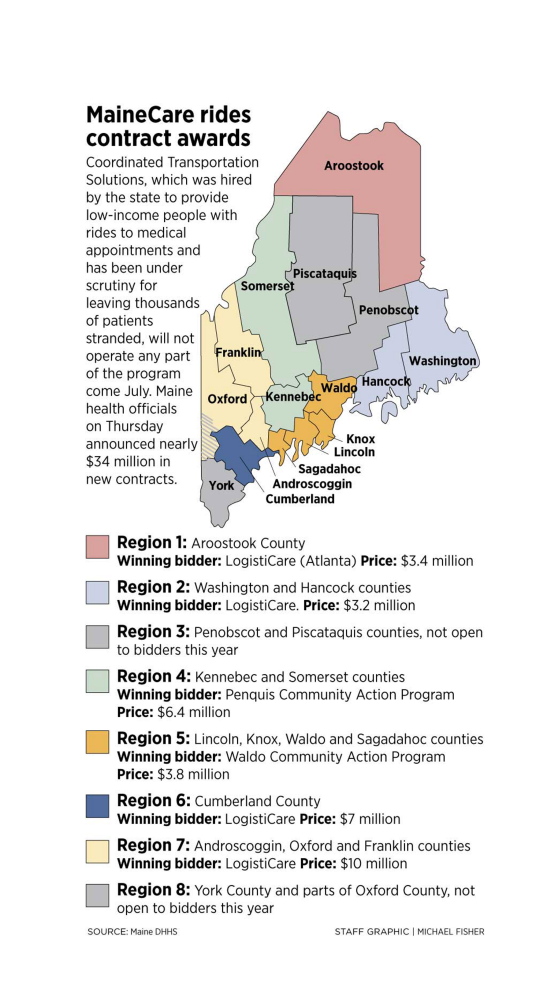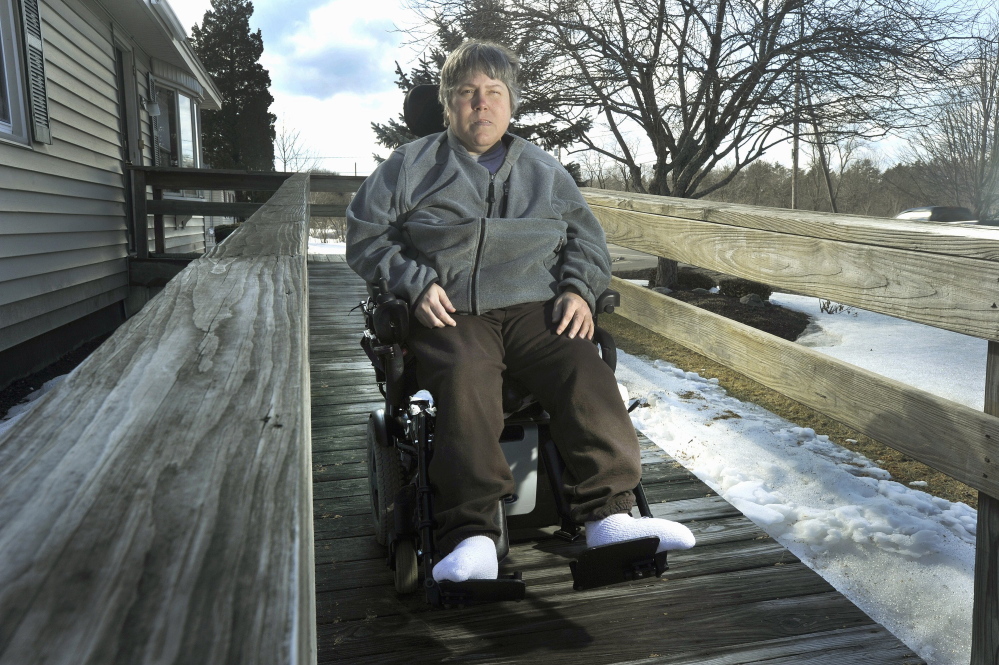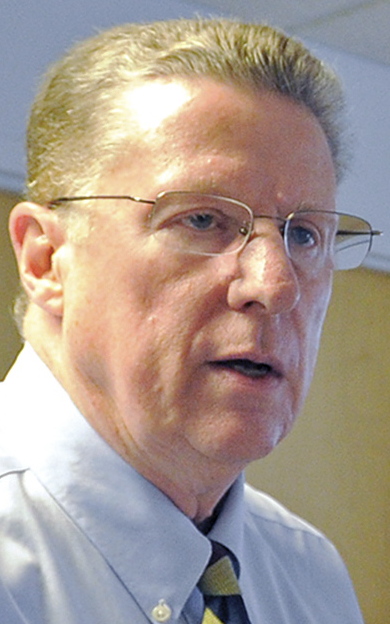In awarding new contracts for MaineCare transportation brokers Thursday, the state dropped a Connecticut company that continually has left low-income Mainers without the rides they need and expanded the reach of another out-of-state contractor, which improved its service after a rocky start last year.
Coordinated Transportation Solutions, which has contracts worth $28.3 million to arrange rides in most of the state through June, submitted proposals for all six regions that were open for bidding, but failed to win any of them. Instead, Atlanta-based LogistiCare won new contracts for four regions. Local transportation providers landed the other two contracts, with service to begin July 1.
LogistiCare was criticized for its work last fall in York County, where patients regularly were left waiting for rides, but the state Department of Health and Human Services determined that the company made significant improvements by the end of 2013.
Patients’ advocates and lawmakers had advocated for more local companies to take over the program, which serves 45,000 Mainers.
“I’m giving (DHHS) a very cautious, ‘Yay,’ ” said Nancee Campbell of Augusta, a MaineCare recipient who has endured numerous missed or late rides under Coordinated Transportation Solutions.
The total cost of the program will increase from about $40 million in 2013-14 to $46 million in 2014-15, because of higher bids from the winning contractors. Losing bidders have 15 days to appeal.
State Rep. Drew Gattine, D-Westbrook, said he is “not at all confident” that the changes will help overhaul the system. He said he fears that this July will be a repeat of last August, when lawmakers and the media were flooded with calls from angry patients who had no way to get to appointments including radiation treatment, physical therapy or mental health counseling.
“I’m curious and nervous about it,” said Gattine, a member of the Legislature’s Health and Human Services Committee. “This is something we’ll be keeping a very close eye on.”
Rep. Richard Farnsworth, D-Portland, a co-chair of the Health and Human Services Committee, said he is glad that Coordinated Transportation Solutions is out but displeased that more local nonprofits were not selected.
“It’s a mixed bag,” he said.
LEARNING FROM MISTAKES
MaineCare’s rides program has been under fire since Aug. 1, when the state switched from a patchwork of local groups to a system run mostly by regional contractors. The change was made to comply with federal guidelines to prevent fraud, although the federal government did not mandate that Maine adopt the brokerage model.
Lawmakers passed a bill this spring to give local groups a better chance of winning the state contracts, but Gov. Paul LePage vetoed it.
Bob Harrison, a vice president for LogistiCare, said the company learned from its mistakes and will be able to expand to the other regions without the same problems it had last year in York County.
“Within 60 days (in 2013), we built and invested in a program to correct those deficiencies,” Harrison said in an email to the Portland Press Herald. “We did this at a cost of millions of dollars to our company. Today’s announcement shows the Department of Health and Human Services has faith in LogistiCare’s ability to provide MaineCare members in four additional regions with quality medical transportation.”
LogistiCare will coordinate rides in the Portland and Lewiston regions, as well as Down East and in Aroostook County. It won contracts totaling $23.6 million, on top of its renewed $5.1 million contract for the York County region.
Waldo Community Action Partners won a $3.8 million contract to arrange rides in Lincoln, Knox, Waldo and Sagadahoc counties. The Penquis Community Action Program won a $6.4 million contract to serve the Augusta-Waterville region, in addition to its renewed $7 million contract for the Bangor region.
‘ADVERSARIAL TONE’
David White, president of Coordinated Transportation Solutions, did not respond to requests for comment Thursday.
John Martins, a DHHS spokesman, wrote in an emailed response to questions that the department is paying close attention to the transition.
“We will work very closely with CTS and those who have been chosen to take over the services in the six regions to ensure the smoothest transition possible and minimal disruption of services,” Martins wrote.
Campbell, the MaineCare recipient from Augusta, said she’s concerned that Coordinated Transportation Solutions won’t have much incentive to provide good service, with its contracts ending in two months.
The company failed to take out a performance bond as required in its 2013-14 contracts. The bond would have paid the state hundreds of thousands of dollars for transition costs to new service providers if the state had revoked the contracts.
In grading Coordinated Transportation Solutions’ proposals, the DHHS gave the company consistently low scores for “qualifications and experience.”
State officials wrote that the company’s application was written with an “adversarial tone” and did not “demonstrate ability to acquire performance and payment bonds,” as required. A payment bond ensures that the broker’s subcontractors are paid if a contract is revoked.
The department called out the company for making “inappropriate” statements. According to DHHS documents, the company said it had demonstrated an ability to “work regardless of the political noise motivated by self-interests.”
The state also said the company’s portrayal of being in full compliance last fall was inaccurate.
Campbell said the company demonstrated “arrogance” in its customer service, and that helped seal its fate.
“They thought they could waltz in here and everything would be fine. It wasn’t,” she said.
LOCAL GROUPS LOST OUT
Campbell said she wishes that more local groups had won contracts for the coming year.
Where the local groups lost out on the contracts, they did not score as well as LogistiCare, according to documentation of bid scoring sheets provided to the Press Herald.
Dan Donovan, transportation director for Aroostook Regional Transportation, said he understands that his bid was higher than LogistiCare’s. His agency bid $4.9 million, while LogistiCare bid $3.4 million for the same service.
Other local nonprofits that bid on contracts were more competitive on price. The contract awards were based on cost, qualifications and experience, scope of work and economic impact.
Donovan said he’s happy that some Maine agencies won contracts but he’s cautious about LogistiCare.
“I don’t have a warm and cozy feeling right now,” he said. “They (LogistiCare) are not a proven commodity in Maine.”
Harrison, the LogistiCare official, wrote that MaineCare patients can “depend on” the company.
“We’re pleased with the state’s decision, and think it’s a testament to the quality service we provide members in York County. We look forward to continuing to serve MaineCare members in York County and helping members in new regions of the state,” Harrison wrote.
Charlie Newton, president of the Penquis Community Action Program, said he believes that LogistiCare will “do quite well” but his agency will continue to compete against LogistiCare for contracts when given the chance.
Penquis beat out LogistiCare and other bidders in the Augusta-Waterville region.
“We’re having a great day,” Newton said Thursday. “It’s all about providing good service to the people.”
Joe Lawlor can be contacted at 791-6376 or at:
jlawlor@pressherald.com
Twitter: @joelawlorph
Send questions/comments to the editors.






